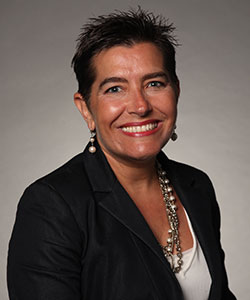Nursing Informatics Director Sees Opportunity and Peace of Mind in the Compact
 As system director for nursing informatics at Franciscan Missionaries of Our Lady Health System -- one of the largest in Louisiana, with hospitals, clinics and physicians located throughout the state and in Mississippi -- Charla Johnson, MSN, RN, ONC, recalls when the NLC was implemented in Louisiana in the summer of 2019. She encouraged her colleagues to listen to an NLC webinar held by NCSBN at the time.
As system director for nursing informatics at Franciscan Missionaries of Our Lady Health System -- one of the largest in Louisiana, with hospitals, clinics and physicians located throughout the state and in Mississippi -- Charla Johnson, MSN, RN, ONC, recalls when the NLC was implemented in Louisiana in the summer of 2019. She encouraged her colleagues to listen to an NLC webinar held by NCSBN at the time.
“I pooled all of the nurses who were in the building, whether they were under my umbrella or not, and we listened to that webinar,” says Johnson. “It was new legislation for Louisiana.”
Thinking back and reflecting now, Johnson describes the webinar as an eye-opener. “As our health ministry grows across state lines, I realized that the multistate license would have an impact,” she says. “How many patients did I actually coach and talk with, or provide patient education to, through the phone? I never even thought about what their ZIP code was.”
Johnson’s nursing career has spanned more than three decades. Over the years, as Johnson took on increased responsibilities in managerial and professional development roles, she gravitated toward care management and informatics. Nursing informatics professionals work with others across the care continuum to maintain a focus on patient safety. “I’m not inside the hospital setting, but offsite we have case managers doing audit reviews, informaticists, I.S. analytics and trainers to name a few,” explains Johnson. “We recently added a facility in Mississippi to our health care ministry. In the future, there will be more onsite interaction as we integrate that hospital onto our electronic health medical records.”
In the NLC, Johnson saw opportunity and peace of mind. “I wanted to lead the pack,” she says. “I can see the necessity of having a multistate license in my role in the integration of health care. If I go into that facility in Mississippi -- and if I’m talking to nurses who are having issues around the electronic medical record, or improving efficiencies related to the care of a patient -- I now don’t have to worry about whether I am using my clinical skills or knowledge across a state line.”
Care coordination was also a concern. “Our facilities have large programs -- orthopaedics, bariatrics, oncology and heart programs -- and because of where we are located, we get patients from Mississippi and Texas,” she explains. “I’m using my nursing expertise. We hadn’t thought about that being a practice issue. The multistate license issue opened our eyes. Myself and our chief nursing informatics officer have gotten our multistate licenses because of that. We’ve also reached out to bring in awareness to our coordinators, to let them know that if they are using their clinical skills, we are encouraging them to consider the multistate license.”
Over the span of her career, Johnson has seen the health care landscape change. “I’ve seen the push to promote interoperability, the meaningful use of our electronic health record, and the sharing of patient information so that there is no duplication of efforts.” She has also seen how individual hospitals are finding it more difficult to stand alone. “More and more hospitals are becoming part of health systems,” she says. “It’s important that we align our practices and our electronic medical record endeavors. If you’re using your clinical nursing knowledge and if you’re working across states, you need to have a multistate license.”
Johnson is also a current doctor of nursing practice candidate. As she looks toward the future and getting her degree, she says, “If I am ever going to be an adjunct faculty anywhere for an online program, I will need a multistate license. Now that worry is gone. It’s behind me. And it was a very easy process.”
